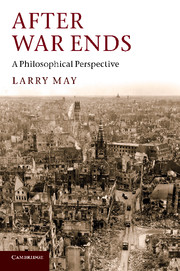Book contents
- Frontmatter
- Contents
- Acknowledgments
- Chapter 1 Introduction
- Part I Retribution
- Part II Reconciliation
- Part III Rebuilding
- Part IV Restitution and reparation
- Chapter 10 Restitution and restoration in jus post bellum
- Chapter 11 A Grotian account of reparations
- Part V Proportionality and the end of war
- Bibliography
- Index
Chapter 10 - Restitution and restoration in jus post bellum
Published online by Cambridge University Press: 05 June 2012
- Frontmatter
- Contents
- Acknowledgments
- Chapter 1 Introduction
- Part I Retribution
- Part II Reconciliation
- Part III Rebuilding
- Part IV Restitution and reparation
- Chapter 10 Restitution and restoration in jus post bellum
- Chapter 11 A Grotian account of reparations
- Part V Proportionality and the end of war
- Bibliography
- Index
Summary
Restitution is the restoring to the rightful owner what has been lost or taken away. Reparation is the restoring to good condition of something that has been damaged. Both categories, restitution and reparation, at least according to Webster’s Unabridged Twentieth Century Dictionary, have the same root, restoration. But each emphasizes different aspects of the idea of restoring. In discussions about jus post bellum, these concepts should not be confused or simply equated. Restitution is normally about justice concerning two parties: a wrongdoer and a wronged party. Reparation is about two parties as well. In some cases, as we will see, the parties who should provide restitution or repair are different from these two parties. Sometimes achieving justice involves a damaged party and others who can correct the damage, not necessarily the one who caused the damage. The one who has caused the damage is not alone the one who has a duty of restitution or repair. I will attempt to develop these ideas in some detail in this and the next chapter, as well as indicate how they can be understood as normative principles of jus post bellum.
This chapter will proceed as follows. First, I will discuss the general idea of restoration as it relates to the idea of a status quo ante. Second, I will offer an account of restitution along with some examples. Third, I will give a specific analysis of restitution in the context of war. Fourth, I will discuss one very important controversy, namely who is responsible for providing restitutions in the aftermath of war, and how might the costs of wars be spread to those who did not perpetrate the harms of war. In this section I will propose a normative principle of restitution. Finally, I will address some objections to the view I have here set out.
- Type
- Chapter
- Information
- After War EndsA Philosophical Perspective, pp. 183 - 199Publisher: Cambridge University PressPrint publication year: 2012

